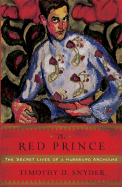

As the 20th century dawned, the House of Habsburg continued to take the long view of history. Rudolf, founder of the Habsburg dynasty, was elected Holy Roman Emperor in 1273; there were ups and downs (to put it mildly) during the following 650 years, but the Habsburgs always wielded power somewhere. Emperor Franz Josef ascended the Austrian throne in 1848 during the rise of the Age of Nationalism and survived. Archduke Wilhelm and his older brother Albrecht grew up in a milieu that believed, in Snyder's cogent summary, "If nationalism must come, let it work for the enlargement of the empire rather than its disintegration. For the plan to work, Habsburg archdukes would have to re-create themselves, in advance, as national leaders."
Despite the demise of the Austro-Hungarian Empire after World War I, Wilhelm and Albrecht kept the faith. Albrecht envisioned becoming King of Poland just as Wilhelm planned to be King of the Ukraine under the umbrella of a restored Habsburg monarchy. Evidence of the impossibility of Wilhelm's dream accumulated throughout his incarnations as World War I officer, diplomat championing recognition of the Ukrainian National Republic, bisexual playboy driven from France in disgrace, German officer in World War II, agent for Ukrainian nationalists in post-war Vienna and, finally, Stalin's political prisoner. In Snyder's telling, Wilhelm's European journey is a tale of hope and persistence (including numerous political alliances, many questionable and nefarious) alternating with true horrors.
Snyder draws parallels between the Habsburg dream at the beginning of the 20th century and the organization of the European Union at the beginning of the 21st. His argument that the E.U. bears significant similarities to the Habsburg blueprint for organizing independent nation states under an over-arching authority is one more illuminating flourish in this brilliant work of history that also allows space to note twin ironies: the Habsburg crown now appears on every bottle of beer produced at the Zywiec brewery in Poland (formerly run by Archduke Albrecht, confiscated by the Nazis, taken over by the Polish communist government and now owned by Heineken); in Vasyl Vyshyvanyi Square in Lviv, Ukraine, there is a pedestal dedicated to Wilhelm using his Ukrainian name--Vasyl Vyshyvanyi stands for Vassily the Embroidered--but the pedestal is missing a statue.--John McFarland

